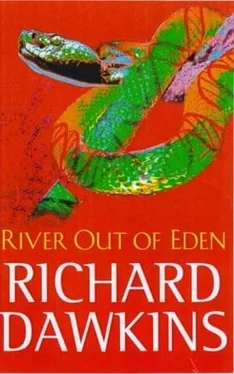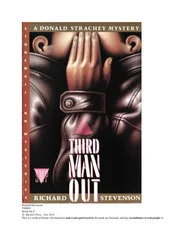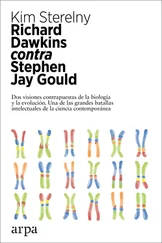Others, no doubt, come to religion by different routes, but certainly many people have had an experience similar to the one that changed the life of this minister (whose identity I shall withhold out of good manners). They have seen, or read about, some marvel of nature. This has, in a {61} general way, filled them with awe and wonderment, spilling over into reverence. More specifically, like my correspondent, they have decided that this particular natural phenomenon – a spider's web, or an eagle's eye or wing, or whatever it is – cannot have evolved by gradual stages, because the intermediate, half-formed stages could not have been good for anything. The purpose of this chapter is to destroy the argument that complicated contrivances have to be perfect if they are to work at all. Incidentally, orchids were among Charles Darwin's favorite examples, and he devoted a whole book to showing how the principle of gradual evolution by natural selection triumphantly meets the ordeal of explaining “The Various Contrivances by which Orchids are Fertilised by Insects.”
The key to the minister's argument lies in the assertion that “in order for that reproductive strategy to have worked at all, it had to be perfect the first time. No incremental steps could account for it.” The same argument could be made – frequently has been made – for the evolution of the eye, and I'll return to this in the course of the chapter.
What always impresses me whenever I hear this kind of argument is the confidence with which it is asserted. How, I want to ask the minister, can you be so sure that the wasp-mimicking orchid (or the eye, or whatever) wouldn't work unless every part of it was perfect and in place? Have you, in fact, given the matter a split-second's thought? Do you actually know the first thing about orchids, or wasps, or the eyes with which wasps look at females and orchids? What emboldens you to assert that wasps are so hard to fool that the orchid's resemblance would have to be perfect in all dimensions in order to work? {62} Think back to the last time you were fooled by some chance resemblance. Perhaps you raised your hat to a stranger in the street, mistaking her for an acquaintance. Film stars have stand-in stuntmen or stuntwomen to fall off horses or jump off cliffs in their stead. The stuntman's resemblance to the star is usually extremely superficial, but in the fleeting action shot it is enough to fool an audience. Human males are roused to lust by pictures in a magazine. A picture is just printing ink on paper. It is two-dimensional, not three. The image is only a few inches high. It may be a crude caricature consisting of a few lines, rather than a lifelike representation. Yet it can still arouse a man to erection. Perhaps a fleeting view of a female is all a fast-flying wasp can expect to get before attempting to copulate with her. Perhaps male wasps notice only a few key stimuli anyway.
There is every reason to think that wasps might be even easier to fool than humans. Sticklebacks certainly are, and fish have bigger brains and better eyes than wasps. Male sticklebacks have red bellies, and they will threaten not only other males but also crude dummies with red “bellies.” My old maestro, the Nobel Prize-winning ethologist Niko Tinbergen, told a famous story about a red mail van that drove past the window of his laboratory, and how all the male sticklebacks rushed to the window side of their tanks and vigorously threatened it. Female sticklebacks that are ripe with eggs have conspicuously swollen bellies. Tinbergen found that an extremely crude, vaguely elongated, silvery dummy, looking nothing like a stickleback to our eyes but possessed of a well-rounded “belly,” evoked full mating behavior from males. More recent experiments in the school of research founded by Tinbergen have shown {63} that a so-called sex bomb – a pear-shaped object, rounded plumpness personified but not elongated and not fishlike by any stretch of the (human) imagination – was even more effective in arousing the lusts of the male stickleback. The stickleback “sex bomb” is a classic example of a supernormal stimulus – a stimulus even more effective than the real thing. As another example, Tinbergen published a picture of an oystercatcher trying to sit on an egg the size of an ostrich egg. Birds have bigger brains and better eyesight than fish – and a fortiori than wasps – yet oystercatchers apparently “think” that an ostrich-sized egg is a superlative object for incubation.
Gulls, geese and other ground-nesting birds have a stereotyped response to an egg that has rolled out of the nest. They reach over and roll it back in with the underside of their bill. Tinbergen and his students showed that gulls will do this not just to their own eggs but to hens' eggs and even wooden cylinders or cocoa tins discarded by campers. Baby herring gulls get their food by begging from their parents; they peck at the red spot on the parent's bill, stimulating the parent to regurgitate some fish from its bulging crop. Tinbergen and a colleague showed that crude cardboard dummies of a parent's head are very effective in provoking begging behavior from the young. All that is really necessary is a red spot. As far as the baby gull is concerned, its parent is a red spot. It may well see the rest of its parent, but that doesn't seem to be important.
This apparently restricted vision is not confined to baby gulls. Adult black-headed gulls are conspicuous because of their dark face masks. Tinbergen's student Robert Mash investigated the importance of this to other adults by painting {64} wooden dummy gull heads. Each head was stuck on the end of a wooden rod attached to electric motors in a box so that, by remote control, Mash could raise or lower the head and turn it left or right. He would bury the box near a gull nest and leave it with the head safely out of sight beneath the sand. Then, day after day, he would visit a blind near the nest and observe the nesting gulls' reaction to the dummy head when it was raised and turned this way or that. The birds responded to the head and to its turning just as though it were a real gull, yet it was only a mock-up on the end of a wooden rod, without any body, without legs or wings or tail, silent and without movement apart from a pretty unlifelike, robotic rising, rotating and lowering. To a black-headed gull, it seems, a threatening neighbor is little more than a disembodied black face. No body, or wings, or anything else seem to be necessary.
Just to get into the blind to observe the birds, Mash, like generations of ornithologists before him and since, exploited a long-known limitation of the bird nervous system: birds are not natural mathematicians. Two of you go to the blind, and only one of you leaves it. Without this trick, the birds would be wary of the blind, “knowing” that somebody had entered it. But if they see one person leave, they “assume” that both have left. If a bird can't tell the difference between one person and two, is it all that surprising that a male wasp might be fooled by an orchid that bore a less than perfect resemblance to a female?
One more bird story along these lines, and it is a tragedy. Turkey mothers are fierce protectors of their young. They need to protect them against nest marauders {65} like weasels or scavenging rats. The rule of thumb a turkey mother uses to recognize nest robbers is a dismayingly brusque one: In the vicinity of your nest, attack anything that moves, unless it makes a noise like a baby turkey. This was discovered by an Austrian zoologist named Wolfgang Schleidt. Schleidt once had a mother turkey that savagely killed all her own babies. The reason was woefully simple: she was deaf. Predators, as far as the turkey's nervous system is concerned, are defined as moving objects that don't emit a baby's cry. These baby turkeys, though they looked like baby turkeys, moved like baby turkeys, and ran trustingly to their mother like baby turkeys, fell victim to the mother's restricted definition of a “predator.” She was protecting her own children against themselves, and she massacred them all.
Читать дальше












